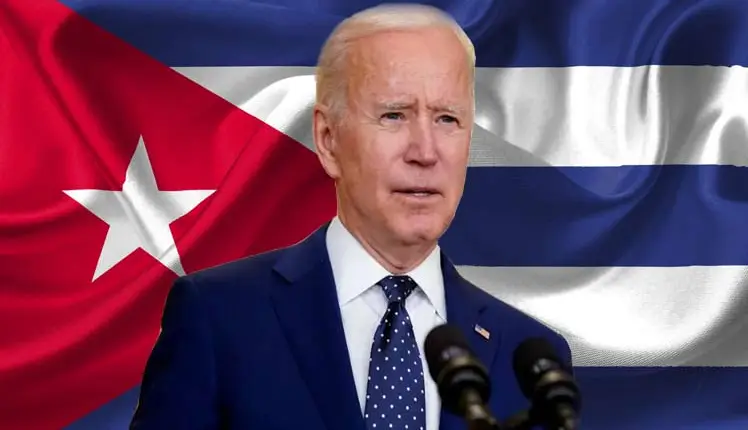
U.S. announces ease of restrictions on Cuba. Cuba reacts, states: ‘A limited step in the right direction’
U.S. announcement
The United States is taking a series of steps to increase support for the Cuban people in line with our national security interests. The Cuban people face an unprecedented humanitarian crisis, and our policy will continue to focus on empowering the Cuban people to help them create a future free from repression and economic suffering.
Specifically, the Administration will take the following measures:
- Facilitate family reunification by reinstating the Cuban Family Reunification Parole Program (CFRP) and continuing to increase the capacity of consular services. Limited immigrant visa processing resumed in Havana on May 3, 2022. We will reinstate CFRP and increase visa processing in Havana while continuing to process most immigrant visa cases at the U.S. Embassy in Georgetown, Guyana.
- Strengthen family ties and facilitate educational connections for Americans and Cubans by expanding authorized travel in support of the Cuban people. We will authorize regular and charter flights to locations outside of Havana. We will also implement regulatory changes to reinstate group “people-to-people” travel and other categories of group educational travel, as well as certain travel related to professional meetings and professional research, including to support expanded Internet access and remittance processing businesses, and provide additional support to Cuban entrepreneurs. We are not going to reinstate individual “person-to-person” travel.
- Increase support for independent Cuban entrepreneurs. We will encourage business opportunities outside of the state sector by authorizing access to cloud technology, application programming interfaces, and e-commerce platforms. We will explore options to expand support for additional payment options for Internet-based activities, electronic payments, and business with independent Cuban entrepreneurs. We will work to expand entrepreneurs’ access to microfinance and training.
- Ensure that remittances flow more freely to the Cuban people without enriching those who commit human rights abuses. Specifically, we will eliminate the current limit on family remittances of $1,000 per quarter per sender-recipient and will authorize donations (ie, non-family) remittances, which will support independent Cuban entrepreneurs. We will engage with electronic payment processors to promote greater accessibility to the Cuban market. We will not remove entities from the Cuba Restricted List.
The Administration is working expeditiously to effect these changes, which will be implemented through the steps taken and the regulatory changes made by the relevant Departments and Agencies in a short time.
*****
“A limited step in the right direction”
MINREX (Cuba’s Ministry of Foreign Affairs) statement
The government of the United States announced several measures, considered positive but very limited in scope, with respect to Cuba in terms of visas, regular migration, flights to the provinces, remittances and adjustments to regulations for transactions with the non-state sector.
By its nature, it is possible to identify [in the announcement by the U.S.] some of the promises made by President Biden during the 2020 election campaign to alleviate inhumane decisions made by the Trump administration, which tightened the blockade to unprecedented levels and the “maximum pressure” policy since then applied against our country.
The announcements do not modify the blockade in any way, nor the main economic blockade measures taken by Trump, such as the listings of entities that are subject to additional coercive measures, nor does it eliminate travel bans on Americans.
It does not reverse the arbitrary and fraudulent inclusion of Cuba on the State Department’s list of countries that are allegedly sponsors of terrorism, one of the main causes of the difficulties that Cuba encounters for its commercial and financial transactions in many parts of the world.
It is, however, a limited step in the right direction, a response to the denunciation of the Cuban people and government. It also responds to calls from American society and Cubans residing in that country. This has been a demand of the Community of Latin American and Caribbean States and that of almost all the member states of the United Nations, expressed in the overwhelming vote against the blockade. They are fair demands that have been ignored by the United States government at a very high cost to our population.
Since 2019, the blockade has been extremely intensified, opportunistically taking advantage of the context of the Covid 19 pandemic, the international crisis and the consequent economic depression. Without exaggeration, the consequences of this siege can be described as devastating. The increase in migration is proof of this.
In taking these limited steps, the State Department uses openly hostile language, accompanied by traditional slanders and new fallacies that have become fashionable in recent months, demonstrating that the objectives of the United States’ policy against Cuba have not changed, nor have its main tools.
To know the real scope of this announcement, we must wait for the publication of the regulations used to implement them.
The Government of Cuba reiterates its willingness to initiate a respectful dialogue on an equal footing with the Government of the United States, based on the Charter of the United Nations, without interference in internal affairs and with full respect for our independence and sovereignty.


